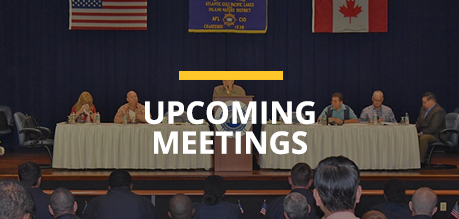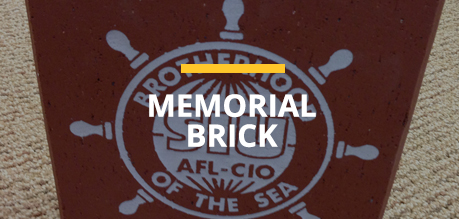The Texas Gulf Coast AFL-CIO issued the following news release on October 27.
Seafarers International Union Unveil Documentary Featuring
Burmese-American Shwe Aung
On Sunday afternoon, The Seafarers International Union, in conjunction with sponsors that include the Texas AFL-CIO and the Texas Gulf Coast Area Labor Federation, will unveil a documentary that chronicles the harrowing story of Shwe Aung. Shwe Aung is a Burmese American who began his journey to the U.S. while serving as a Merchant Mariner on a Burmese ship that refused to pay its workers for 8 months. He became a Labor Activist and a pariah in his home country, with disastrous results for obtaining a passport and safe passage around the world. His journey as a U.S. citizen and renowned Labor Leader for Seafarers International and the International Trade Federation began after docking at the Port of Houston in 2001. His complete biography is found below.
Dean Corgey, International Vice President with Seafarers International and Labor Representative on the Harris County Port Commission, gives a glowing testimony to Shwe’s tenacity and perseverance:
“Shwe Aung epitomizes the American dream. He left a tyrannical regime in Burma (also called Myanmar) to sail around the world as a hard-working merchant mariner. Shwe has suffered persecution in his quest to find help around the world, which he finally found right here in Houston. As one of the most welcoming and diverse cities in the United States, it is fitting that Shwe found his home here. Shwe is a champion for workers’ rights and has succeeded in getting millions of dollars in back wages paid to those sailors who were being cheated on their pay. He has succeeded in organizing a Burmese Seafarers Union, affiliated with the ITF, which is improving the working conditions for all Burmese mariners. He is the finest example I know of what it is to be a true American.”
The documentary, entitled “The Burmese Cowboy,” will be shown at the Seafarers International Hall located at 625 North York, Houston, TX 77003-1329. The event starts at 2 p.m. and will feature food, drinks, and live entertainment following the film. Any voluntary donations will benefit the Texas AFL-CIO’s Texas Workers Relief Fund, and 501-c-3 arm of the Texas AFL-CIO that has been instrumental in Hurricane Harvey relief efforts. The event ends at 5 p.m. and is open to the public. Kid-friendly. For more information, please contact Emily Rosales at 713/659-5152 or [email protected].
Shwe Aung Biography
Shwe T. Aung left his home country of Burma to work on a ship in 1996. He soon discovered there were stark differences between working in union and non-union worksites. In Bangkok, General Secretary of the Federation of Trade Unions of Burma (FTUB), Maung Maung asked Aung to join the union. Aung worked on trying to set up a Seafarers union in Burma. In 1997-98, Aung was working on a ship with Burmese workers who did not get paid for 8 months. These workers were afraid to ask for their wages and passed through countries in Africa where there were weak unions. When they landed in Brazil, they called the ITF (International Transport Federation) for help. The shipping company paid the Ambassador to intimidate the workers and threatened to put Aung in jail. Eventually, after meeting with the ITF Inspector, the Captain, and Ambassador, the workers obtained their unpaid wages. Radio Free Asia, the Asian version of Voice of America, conducted a story on the incident and interviewed Aung. He had to go back to Thailand because he had been placed on a blacklist for his union activities in Burma. He could not find a job because every agency knew him as a “troublemaker”. Then, an opportunity came up to work with ITF. The ITF was planning to sail an Exhibition Ship for Labor issues around the world to educate about child labor, forced labor, and conditions facing seafarers. Aung was offered a contract as an “AB”, an Able-bodied Seaman. Eight days before the end of his contract in 2000, the ship sank in Venezuela’s Orinoco River as a result of a collision. “Nobody had anything except for the clothes on their backs,” said Aung. Everyone obtained passports from their own countries. However, when Aung applied for a new passport, the Burmese government wanted to take him back to Burma. He sent a letter to the ITF. It took 9 months to get a passport. During that time, he had to report to the INS every day. He didn’t speak Spanish and became depressed. Attached to Aung’s Burmese passport was a memo that indicated that he should return to Burma. If he were to come back to Burma, he would be jailed for his labor activism.
He applied for asylum. Once his application for Brazilian asylum was rejected, he applied to the Canadian Ambassador. The Canadian unions wanted to help him; however, the memo attached to his passport made it impossible to attain asylum. The ITF tried to bring him to London on a tourist visa since asylum applicants must be physically present to apply. Subsequently, he applied for a tourist visa and was rejected. Fortunately, he received a six-month extension to stay in Rio Di Janeiro. With one day remaining on his extension, a ship docked for loading. The ITF had good relations with that ship and Aung joined the crew. Two months later, in 2001, the ship came to the United States. The ITF called Dean Corgey at SIU in Houston. They hired a lawyer to go down to the docks and meet Shwe. Unfortunately, immigration officers got there first and Aung was taken to an immigration detention center. Aung was detained for a month through the Christmas and New Year holidays. Eventually, the immigration detention center released him until his court hearing. During his hearing, the judge presiding over Aung’s immigration case called Maung Maung in Thailand to confirm Aung’s story. Aung was then granted asylum. After the hearing, SIU sent Aung to their Seamen School in Piney Point, MD. During his training, Aung applied to become an ITF Inspector, based at SIU. He didn’t have experience at inspections, but he said, “If you give me 6 months and I don’t do the job, I’ll quit.” Today, Shwe helps mariners, union and non-union members, from around the world who dock in the ports of the Texas Gulf coast. He is thankful for the opportunity that SIU has given him. “Jimbo and Dean have been really good to me,” he says. Known for his tenacity in securing the wages owed to the workers, Shwe has dishonest ship captains quaking in their boots. Some ship owners think he’s being too strict, but Shwe says, “I just calculate what is owed to the workers, not one cent more, not a cent less.”
In addition to Shwe’s roles with the ISU and the ITF, Shwe serves on both the Texas and National Boards of APALA. Founded in 1992, the Asian Pacific American Labor Alliance (APALA), AFL-CIO, is the first and only national organization of Asian American and Pacific Islander (AAPI) workers, most of who are union members, and its allies advancing worker, immigrant and civil rights. Since its founding, APALA has played a unique role in addressing the workplace issues of the 660,000 AAPI union members and in serving as the bridge between the broader labor movement and the AAPI community. Backed with strong support of the AFL-CIO, APALA has more than 20 chapters and pre-chapters and a national office in Washington, D.C.
# # #





Comments are closed.